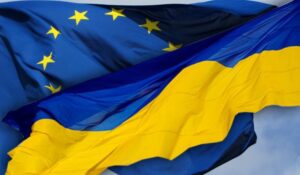
The Cabinet of Ministers has abolished the import duty on acetic acid, Taras Melnychuk, the Cabinet’s representative in the Verkhovna Rada, said on Telegram.
The corresponding draft law “On Amendments to the Customs Tariff of Ukraine, established by the Law of Ukraine “On the Customs Tariff of Ukraine”, regarding the change in the duty rate on acetic acid” was approved at a government meeting on Tuesday.
“The draft law proposes to establish a zero import duty on acetic acid, which is a raw material for ethyl acetate production, to create conditions for the functioning of domestic ethyl acetate production,” Melnychuk said.

The volume of Ukraine’s gross external debt increased by $8.8bn during the second quarter of this year and amounted to $148.6bn at the end of the half-year, according to the website of the National Bank of Ukraine (NBU).
“Relative to GDP, the debt increased from 90.5% to 92.7%,” the National Bank noted.
At the same time, the external debt of the public sector for the second quarter of 2023 increased by $8.4 billion to – $84.5 billion (52.7% of GDP), while the debt of the private sector – by $0.4 billion to $64.1 billion (40% of GDP).
As indicated by the National Bank, the growth in the public sector was due to net attraction of $8.8 billion in loans from international partners, including $3.6 billion from the International Monetary Fund (IMF), while the government debt on securities decreased by $0.12 billion.
According to the central bank, the volume of external liabilities of Ukrainian banks decreased by $0.08bn to $1.8bn (1.1% of GDP), mainly due to the reduction of debt on loans by a similar amount.
External debt of other sectors of the economy increased by $0.2bn to $41.3bn (25.8% of GDP). As explained by the regulator, this was due to the growth of external debt on guaranteed loans – by $0.14 billion and securities – by $0.05 billion.
Debt of other sectors of the economy, including intercompany debt, increased by $0.52 billion to $62.3 billion (38.9% of GDP) in the reporting quarter.
Direct intercompany debt of enterprises in direct investment relations increased by $0.28 billion to $21 billion (13.1% of GDP) in the quarter due to the increase in external debt on credits and loans of direct investors by $0.26 billion.
The NBU estimated the increase in private sector debt due to exchange rate changes at $0.4 bln.
The volume of overdue debt of the real sector on non-guaranteed loans (including from direct investors) increased by $0.13bn in April-June and amounted to $25.4bn (15.9% of GDP) at the end of the second quarter. According to the NBU, the share of Cyprus in it is 58.1%. In addition, the shares of the UK increased by 1 percentage point (p.p.), to 9.2%, and the Netherlands – by 3 p.p., to 5.8%.
According to the National Bank, Cyprus at the end of the second quarter remained the main creditor country in terms of the geographical structure of private sector debt on non-guaranteed loans (together with intercompany debt) – 49.2% of the total volume, its share since the beginning of the year increased by 0.4 p.p.
The shares of the Netherlands, Germany and Switzerland increased by 0.1 pp. to 7.3%, 3.0% and 2.6% respectively, while the share of the USA remained at 3.0% and the shares of the UK and Luxembourg decreased by 0.1 pp. – to 10.7%.
The main currency of Ukraine’s external borrowings at the end of Q2 2023 remains the US dollar – 50% of total external debt, but its share decreased by 3 p.p. over the quarter. At the same time, the share of borrowings in euros increased from 31.9% to 33.8%, as well as in SDRs to the IMF – from 9.9% to 11.4%, while the share of external debt in hryvnia decreased by 0.2 p.p. to 1.6%. – to 1.6%.
The volume of short-term external debt by residual maturity for the second quarter of 2023 increased by $1.2 billion and amounted to $40.8 billion as of June 30, 2023.
Meanwhile, general government liabilities that require repayment over the next 12 months increased by $0.9 billion to $3.8 billion due to higher future government loan repayments, including $0.2 billion to the IMF, while central bank repayments decreased by $0.18 billion to $1.3 billion due to lower IMF repayments.
The volume of short-term liabilities of the banking sector remained almost at the level of the previous quarter and amounted to $1.3 bln.
The total volume of real sector borrowings (together with intercompany debt), which are to be repaid over the next 12 months, increased by $0.5bn and amounted to $34.4bn as of June 30, 2023. The National Bank specified that the growth is due to an increase in the volume of future repayments on debt securities by $0.4bn.
Experts Club research project and Maxim Urakin recently released an analytical video about the economy of Ukraine and the world.
Subscribe to the Experts Club YouTube channel by clicking here – https://www.youtube.com/@ExpertsClub

In January-July 2023, international tourism recovered by 84% from the pre-pandemic level of 2019, and an almost complete recovery of the industry is possible by the end of the year, according to the UN World Tourism Organization (UNWTO).
From January to July, 700 million tourist trips were made worldwide, 43% more than in the same period last year. July was the busiest month: 145 million tourist trips were made during this time, which is about 20% of the total for seven months.
“But as the tourism sector recovers, it also needs to adapt. Extreme weather events and overtourism emphasize the need to create a more inclusive, resilient sector to not only ensure the recovery of tourism, but also to redefine it,” said UNWTO Secretary-General Zurab Pololikashvili.
Among the regions of the world, the Middle East, Europe and Africa showed the best results of recovery over the past seven months. According to UNWTO, the Middle East received 20% more tourists than in 2019. European countries have recovered by 91%, driven by strong demand for travel among residents of the region and US citizens. In Africa, the number of tourists reached 92%, in America – 87% of the level of 2019.
In the Asia-Pacific region, the recovery accelerated and reached 61% of pre-pandemic levels after many destinations reopened in late 2022 and early 2023.
“The results show that international tourism is still on the right track and will reach 80-95% of pre-pandemic levels by 2023. The recovery will continue in September-December, albeit at a more moderate pace due to weak demand and a lack of air routes, especially in the Asia-Pacific region, where recovery is still at a moderate level,” the organization explained.
The UNWTO expects that the opening of China and other Asian destinations will continue to stimulate travel both within the region and to other parts of the world.
At the same time, the difficult economic situation continues to hamper the recovery of international tourism in 2023. Persistent inflation and rising oil prices have led to higher transportation and accommodation costs. This may affect tourist spending in the remainder of the year as they increasingly seek value for money, travel closer to home, and take shorter trips.
Change in consumer prices in July 2023

Source: Open4Business.com.ua and experts.news

Passengers have bought 183,500 bags of Gemini tea worth over UAH 3.6 million on Ukrzaliznytsia (UZ) trains, of which UAH 1 million will be used to purchase Ukrainian FPV drones Hrom, Minister of Digital Transformation Mykhailo Fedorov said on his Telegram account.
“Everyone who travels by train can help the Defense Forces. To do this, you need to buy Gemini tea. Part of the funds from each bag will be used to buy drones for the military,” the minister emphasized.
UZ noted that such tea can be ordered in the app, chatbot, or on the website, as well as directly on the train (except for Intercity+). The cost of the drink is UAH 20, of which UAH 5.5 from each bag goes to raise funds that will be transferred through the UNITED24 platform for the purchase of Ukrainian-made FPV copters “Thunder”. The cost of one such drone is UAH 21 thousand.

Farmers with more than 1,500 hectares of winter crops can insure their crops against war risks with a limit of indemnity from UAH 500 thousand to UAH 2 million in INGO Insurance Company until December 15, the company said in a statement.
“In the world practice, war risks are always included in the list of standard exclusions, and losses are not compensated,” the press release quotes INGO’s Director of Corporate Insurance Serhiy Krivosheev as saying. – “However, now in Ukraine we are ready to revise the rules to create more opportunities for farmers. We understand that not only the economic condition of the agricultural sector, but also many others depend on their success.”
Thus, INGO Insurance Company has expanded its standard winter crops insurance program, which provides protection against negative weather factors (extremely low temperature, ice crust, damping, drought, etc.), to include coverage of crop damage risks resulting from events that were a direct or indirect consequence of military operations.
The company assumes that this will “help agricultural enterprises maintain financial stability.”
It is noted that only winter crops of more than 1500 hectares, which are grown industrially and are located in the unoccupied territory or no closer than 50 km from the combat zone or the state border with Belarus and Russia, can be insured against military risks.
In the event of an insured event, INGO will compensate for the costs of sowing and growing crops damaged or destroyed as a result of military operations, including maneuvers, movement of equipment, construction of defensive structures, and demining costs.
“The company assumes reimbursement of such costs depending on the volume of insured crops with a limit of UAH 500 to 2 million,” the statement said.
According to it, the settlement of insured events for further compensation is carried out according to the standard procedure within 15 days from the date of submission of the necessary documents. A document confirming the fact of occurrence of such an event under military risks should be obtained from the military-civilian administration, the State Emergency Service or the National Police.
INGO Insurance Company has 30 years of experience in the market. Since 2017, the company’s main shareholder has been the Ukrainian business group DCH of Alexander Yaroslavsky.
The company holds 29 licenses for various types of compulsory and voluntary insurance, provides insurance services to corporate and retail clients, and is a full member of the Motor (Transport) Insurance Bureau of Ukraine (MTIBU).
According to the National Bank, as of the middle of this year, INGO Insurance Company was the eighth largest in the market in terms of assets (UAH 3.28 billion). Its net earned insurance premiums for the first half of the year amounted to UAH 971.4 million, insurance payments and reimbursements – UAH 545.6 million, net profit – UAH 152.0 million.